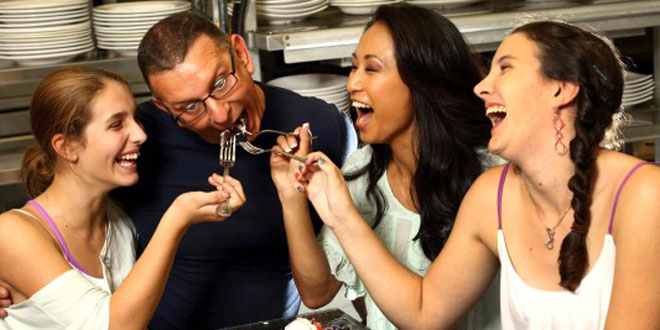
The Overweight Chef
Thanks for all of the great questions we have gotten! Here’s a question that plagues so many Chefs in the industry, “How do I stay fit, when I work with food?”
Do you have any advice for this fan? Post it in the comment thread below!
Sean Asks:
I am an overweight Chef and am currently working on getting into better shape. Is there any information you could give me in terms of eating or work out tips? I realize you are a busy person but any tips you could give me would be really appreciated. Thanks!
Answer:
Maintaining a healthy diet while you are constantly surrounded by food is a major challenge for Chefs everywhere. Tasting is a part of your job, and those little tastes add up everyday to amount to a major intake of calories. Add to that, the hectic environment of a busy kitchen, and you are often found with very little time to eat a nutritious lunch or dinner while preparing for service. Most Chefs often end up consuming whatever is quick and available before the doors open to the customers. However, all is not hopeless! Here are a couple of things that may help you out.
- “Calories in” should equal “calories out.” Chefs are lucky in one aspect; we have the opportunity to do very physical things at work everyday. The problem is, once you reach a certain rank in your career you are more likely to delegate those physical tasks to an underling. DON’T DO THAT! Take every opportunity to get every bit of physical activity that you can during the day. When the big food delivery comes in, put those heavy boxes up yourself. When the dinner rush starts to hit, get on the line and get moving. Just as those little tastes add up to major calories, little movements add up to be a great source of workplace exercise.
- Find the time to sit down and eat. I know it’s hard. You’re under the gun to get prepped for the lunch or dinner rush, and the last thing you have time to do is eat a meal on your own. You must find the time. Rushed eating, or even worse, eating after your shift is over (late night eating) is the worst thing you can do. A great thing to do is to institute and schedule a “family meal” for the entire staff. It helps you, as a manager of food stock, to burn through some of the inventory that may need to get used up, and it forces everyone to stop and eat a proper meal before service starts. Plus, you won’t often be serving a lot of unhealthy or fat-laden foods for a family meal. The items that usually need to get used up and served to the staff are the produce, poultry, and fish items that have a quicker expiration date.
- Put down that soda and grab some water. This is another hard one for Chefs who routinely find themselves in the constant company of the restaurant’s soda gun, but you have to make that sacrifice. It is estimated that cutting out those syrupy drinks can reduce almost 33% of your daily sugar intake. However, you have to make sure you are staying hydrated. Long hours in front of that hot range can quickly bring on dehydration, and water is always the best solution for that. If you must have a bit of caffeine to get through that long shift, try a sugar-free iced coffee. Diet sodas and sugar-free energy drinks aren’t really all that good for you either, but compared to the alternative they are a wiser choice.
- Moderate the nightlife. It’s a well-known fact that restaurant life consists of routine post-shift trips to your local watering hole. Not only are cocktails usually laden with sugary mixers and beer loaded with carbohydrates, but more often than not, late-night drinking is followed by late-night consumption of greasy spoon fare. Cutting back on the bar scene usually equates to cutting down the waistline. It also generally improves the disposition of the Chef who gets a good night’s rest.
These are just a couple of ideas for how to improve your chances of not becoming the next star of Fat Chef (is that even on anymore?). While the truer way to get fit involves dedication to a strict diet and workout regime, most Chefs could benefit from simply ceasing some the bad habits that contribute to that ever-tightening Chef’s coat. Once you begin to break those bad habits, you can then focus on substituting some good ones that will help continue a life of improved health.

